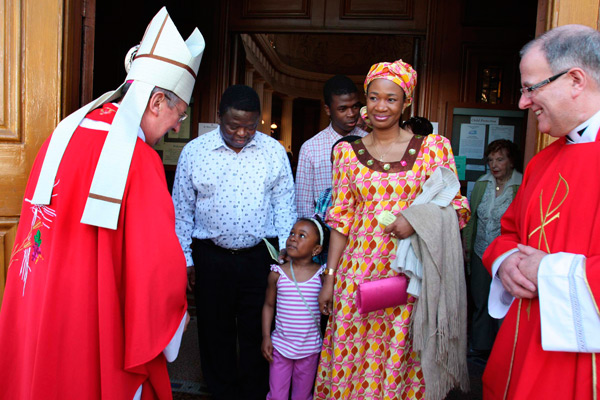
DUBLIN (CNS) — Ireland’s Catholic Church, host of the International Eucharistic Congress, has suffered a dramatic loss of credibility in recent years, but also shows signs of renewal after a decade of turbulence.
While a recent survey by the Association of Catholic Priests found that weekly Mass attendance throughout the country is one of the highest in Europe at 35 percent, the capital — where Mass attendance in some parishes is 2 percent — has been hit by a combination of religious apathy, secularism and disenchantment as a result of clergy sex abuse scandals.
David Quinn of The Iona Institute, a think-tank that aims to highlight the benefits of religion for society, believes it is wrong to present all of the church’s challenges as being linked to clerical abuse scandals. The shift in public opinion, he said, is “driven primarily by the secularizing trends that would have overtaken the rest of Europe over the last century, and only secondly actually by the scandals, because the downward trends were in place before the scandals ever came to light.”
“Church bashing has replaced ‘Brit bashing’ in the national psyche,” he said.
“If you go back to the days when nationalism of a certain type, a one-eyed type of nationalism, was very strong in Ireland, if you did not go along with most vitriolic criticisms of Britain you were a ‘West Brit.’
“We have psychologically replaced this with a very unthinking one-eyed critique of Catholicism,” he said.
But Divine Word Father Vincent Twomey, a moral theologian, thinks the church has to look inward to find the root of its current difficulties.
“Our real problem today is not caused by society or the current government’s policies, which are quite clearly anti-church, anti-Catholic,” he said.
“The church itself has contributed to the secularization of society by failing to grasp the imagination of people, by failing to feed their intellectual thirst for the truth,” he said.
It’s not just theologians who are saying the church has to reshape itself to meet modern challenges.
Bishop Joseph Duffy, speaking just before he retired as bishop of Clogher in 2010, said the church in Ireland is “crying out” for reform. He said the Irish bishops have been “dragging our feet” on the issue of reform and church leaders have not fully embraced the Second Vatican Council.
“What we are really talking about now is radical reform all across the country,” Bishop Duffy told The Irish Catholic newspaper in 2010. “We’re working out a church based on a society that no longer exists. We need to dramatically address whether we’re fit for purpose.
“In the 1960s during the (Second Vatican) Council, we had an Ireland where, by-and-large, everyone went to Mass, we didn’t think that we needed to reform — now it is being forced upon us; if we’re honest we were dragging our feet,” he said.
Bishop Duffy said that “sometimes we’ve tended to protect the institution of the church too much, but the church doesn’t exist for the sake of it, the church exists to respond to the legitimate pastoral needs of the people.”
“This is not going to be about pressing a button and making everything alright again, it’s going to take a lot of hard work and discussion between everyone in the church — bishops, priests and people,” he added.
His challenge is being taken up by some dioceses. In Belfast, Northern Ireland, Bishop Noel Treanor has embarked on an ambitious Living Church program that includes listening sessions in all parishes as well as special sessions for young people and one to which Catholics who no longer practice their faith were invited.
“There are times when the people of God are called to reform and renew the church, and I believe this is one such time,” Bishop Treanor told Catholic News Service.
A 20-page report from the listening sessions has been produced and will form the basis of a diocesan assembly in 2013. The report makes for challenging reading but also offers much hope for the future and many heartening insights. Facilitators reflected their experience that “throughout the diocese there are people who want to help and to play a part in the church’s renewal.”
The document also notes that “many people want to serve the church but feel that they have never been invited or indeed feel discouraged as if surplus to requirements.”
Bishop Treanor said he sees the process leading to the diocesan assembly as “trying together to grow a culture of cooperation, co-exploration and co-responsibility for our church.”
He said he believes that the culture in the church in Ireland must be influenced by what is positive in the wider culture. He notes that modern culture is characterized by a greater sense of participation.
“Everyone expects to participate in governance, to have our voice heard and thus to enhance the quality of governance.”
The results of the 2011 Irish census — the most recent — reveal that some 84 percent of Irish people still continue to self-identify as Catholic. The Iona Institute’s Quinn believes that this is evidence that “the church can be optimistic about the future if it can attract these people to re-engage. But, we mustn’t take anything for granted and assume that identification with the faith will automatically lead to practice.”
Father Twomey remains optimistic.
“What we need first is a spiritual, pastoral, liturgical and theological renewal of the church from within,” he said, adding “that will take time.”
He said he believes that “the kind of listening process that has taken place in some dioceses could be the first step to ensure that both lay and clerics no longer feel that they are second-class members.”
He said the church in Ireland needs “a renewal of catechesis at all levels (above all at primary level), creative evangelization projects, and pastoral initiatives at both diocesan and parish level, all of which need careful preparation.”
— By Michael Kelly, Catholic News Service





